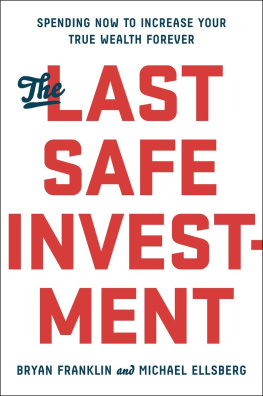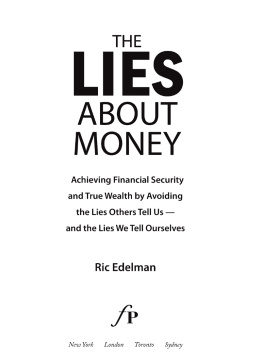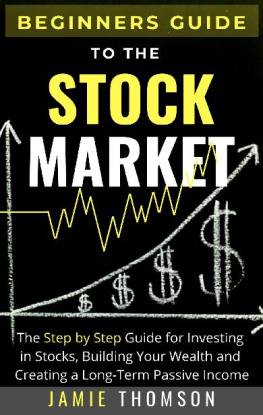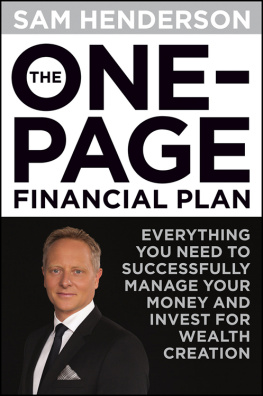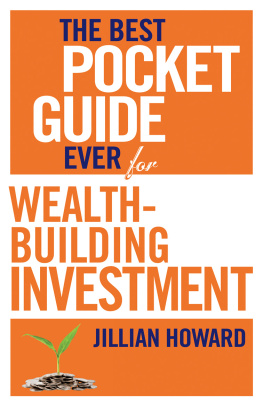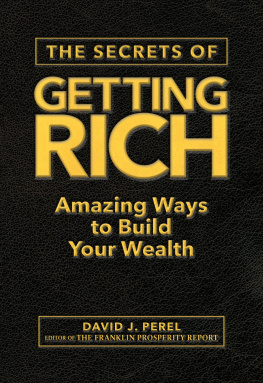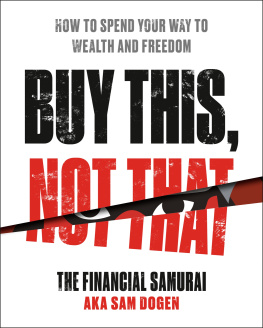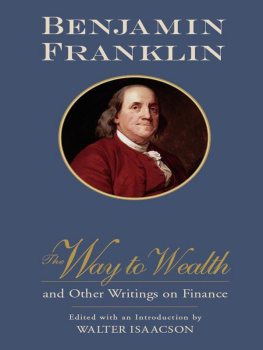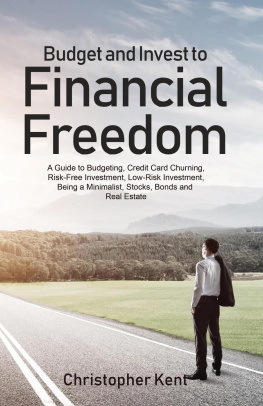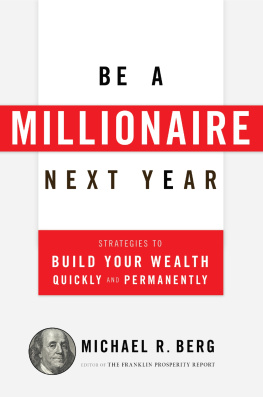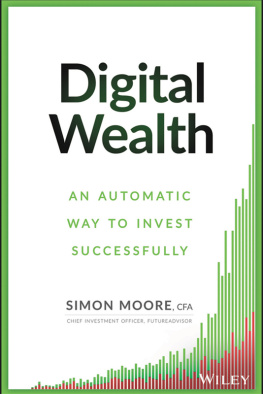PORTFOLIO / PENGUIN
An imprint of Penguin Random House LLC
375 Hudson Street
New York, New York 10014
penguin.com
Copyright 2016 by Michael Ellsberg and Bryan Franklin
Penguin supports copyright. Copyright fuels creativity, encourages diverse voices, promotes free speech, and creates a vibrant culture. Thank you for buying an authorized edition of this book and for complying with copyright laws by not reproducing, scanning, or distributing any part of it in any form without permission. You are supporting writers and allowing Penguin to continue to publish books for every reader.
ISBN 978-1-101-61281-1
Version_1
BRYANS DEDICATION:
For Jennifer Russell
The lover who created me, my true companion, my wife, my one
MICHAELS DEDICATION:
For my coauthor Bryanm
My great mentor in business and life
INTRODUCTION
I snt this the part where you give me your advice for what I should do with my life? Stephen (not his real name), eighteen years old, dressed up in cap and gown, wanted to give his father a chance. In many ways, at least symbolically, last chance. Graduation day, he thought, is the time when a typical father gives a typical son the speech. Imparting the wisdom the father (or mother) has gained through decades of life experience to help shortcut the sons (or daughters) path toward success. So the children can learn as many lessons the easy way and as few the hard way as possible.
But Rick (also not his real name) was short on advice.
He opened his mouth to speak but words didnt come out. Rick reached for what he could tell his son to do, but all that came up were his past mistakes. He paused, wishing badly that Stephen could somehow learn to avoid them.
MISTAKE 1: He leveraged the house with too much debt and ended up underwater.
MISTAKE 2: He spent too much money on things with motors (cars, boats, Jet Skis, motorcycles) and other luxury stuff that was supposed to make him happy but didnt end up doing so. Now Rick wishes he had the money instead.
MISTAKE 3: He went into business by himself but didnt learn how to get customers, relying on a trickle of word-of-mouth referrals to put food on the table. Lean times were really lean and really tense. Fat times could pay the bills and give him extra cash (which usually got spent on luxury stuffsee Mistake 2).
MISTAKE 4: He never found work he could do happily in older age. With no ability to retire anytime soon, at fifty-two years old, he dislikes his work, and therefore, dislikes much of his life, looking forward only to the short respites he gets from work to spend time with his son and other loved ones.
MISTAKE 5: He invested in stocks he didnt understand. Lost those investments.
MISTAKE 6: He spent savings on remodeling the house, betting on the housing market to give him a big payback. That didnt work out. Much of his savings went literally down the drain in his bathroom and kitchen remodels.
Rick looked at his son Stephen. Tall. Put-together. Even-keeled. He got immaculate grades. When Rick put Stephen on his work crews, his son was usually the hardest and most dependable worker. Rick was silent for a moment more, gagging on feelings of inadequacy.
During his fathers silence, Stephen had mixed feelings. He loved his dad and appreciated him. But he also felt kind of let down. If each generation is supposed to reach further up the ladder than the last, why was he being handed a ladder with all the rungs sawed off?
Look, Stephen, youre going to be graduating in a few hours. Id love to be able to tell you what to do to be successful in life. To make sure you dont end up where I am. But honestly I think youd do a better job figuring it out for yourself. All Ive got is bad advice and sad stories.
A version of this same conversation could be happening in thousands of families (perhaps millions) every graduation season. Eighteen- to twenty-two-year-olds look up to their parents for one last set of instructions before leaving the nest, but because of the decline of Americas middle class, and the near-total annihilation of the lower class, parents just dont have a map of the new territory.
The future-planning impulse is to tell the children to invest. But in what? With the most recent financial crisis, subprime housing implosions, and real estate bubbles popping, where are the safe investments?
This book is dedicated to the multitude of Stephens and the multitude of Ricks, regardless of your age, stage of life, marital status, or financial situation: we believe in you. In this book, we deliver to you what we believe is the best advice ever assembled on the topic of how to invest for a successful life for yourself, financial and otherwise, in this new postcrisis landscape.
No matter how many decades have passed between you and your formal education, we also encourage you to think of today as graduation day for you.
Use this manual to start making better life choices that can lead not only to a more financially secure future, but can relieve your stress about money and retirement and also make yourself truly happy in the process.
ALL FACD UP
Heres the bait part of the usual financial bait and switch:
You too can be rich! All you have to do is follow this advice. Work hard and save as much money as you can. Dont drink premium coffee, and be sure to watch movies at home on date night instead of going to a movie theater. Youd be crazy to spend any money at all now because, if you look at the long-term average of stocks, they compound at 7 percent a year above inflation. Dont you know about the magic of compounding returns? If you just sock that saved money away now in a low-fee index fund, a minuscule amount now will be worth millions by the time youre ready to retire. In fact, due to the miracle of compounding returns, that latte you just bought could buy you a trip to Hawaii during your retirement years! So start young, live frugally now, and watch your wealth rise over the long haul. The only other thing that is acceptable to spend money on, aside from higher education (which we all know guarantees you easy access to a good job for reasonable tuition fees), is a home. Home values compound just as stocks compound, and they never go down. In fact, you can ride your rising, compounding 401(k) and home equity right into a wealthy retirement.
We call this Financial Advice Commonly Delivered, or FACD for short.
People who were FACD over the last one and a half decades dont tend to be too happy these days. Over the last fifteen years, the S&P 500 has risen at an annualized rate of about 1.9 percent above inflation per year, and home values have barely beaten inflation. These are not anywhere near the kinds of returns one can hope to build a nest egg on via capital appreciation. People who were hoping to retire on their financial and real estate investments over the last two decades generally feel burned out, spentperhaps even usedby the financial program they were supposed to follow, and by the financial advisers, money managers, stockbrokers, retirement planners, and personal finance gurus who sold them on this program. Whether you think these role players maliciously misled us for their own gain or were merely swept up in a mass cultural delusion, its clear the FACD plan has failed to deliver on its promises over the last fifteen years.
For a variety of reasons, it has become very hard for the average investor to grow significant wealth on the financial and housing markets, no matter how much is scrimped and saved. That is the switch part of the usual financial bait and switch.

